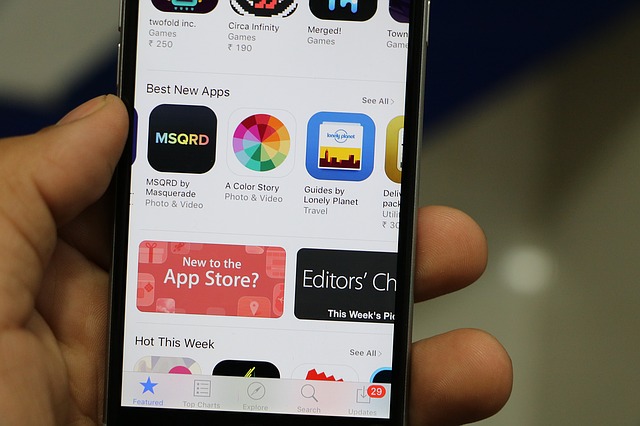Our Friday Song of the Week – California Girls
Beach Boys – California Girls
Apps Store – Avoid Fake Shopping Apps and Scams
 Apps Store – After-Holiday Sale Shoppers Beware: Avoid Fake Shopping Apps and Scams
Apps Store – After-Holiday Sale Shoppers Beware: Avoid Fake Shopping Apps and Scams
According to the New York Times, hundreds of fake retail apps have been popping up in recent weeks on Apple’s Apps Store. With holiday shopping coming to a peak, shoppers are advised to beware of fake retail apps on the apps location. These shopping apps act like and look like authentic shopping apps, but are actually scams targeting consumers’ private data. Big box giant, Amazon has been the target of a new phishing email scam. As more short-on-time consumers pick up their smartphone and iPads to do last minute holiday shopping, cyber crooks will try just about anything to scam them out of their hard-earned money. When shoppers think they’re getting a great discount on luxury brand items, they often overlook one very crucial question: Is this too good to be true? Unfortunately, yes, it is.
The Dangers of Fake Retail Apps
This year, more people are expected to shop online than ever before. But before you get excited about an amazing deal, understand that cybercriminals are waiting to prey on holiday online shoppers like you.
The risks of using a fake app include:
• Financial Fraud: Scammers are taking advantage of the holiday season because it’s a time when many people are inputting credit card information online for purchasing gifts.
• Malware: Fake apps can contain malware, which can steal your personal information or lock your phone until you pay a ransom.
• Exposing data: Some fake apps ask for your Facebook login information so they can expose your sensitive personal data.
How to Spot a Fake App on the Apps Store
Though Apple is remaining “vigilant” about spotting and removing fake apps from the apps location, before they put users at risk, there are things you can look out for yourself.
• Verify the app’s publisher. Cybercriminals will intentionally use a name very similar to the real retail app they’re mimicking. For example, the real Overstock app is published by Overstock.com. But a fake app that popped up in the App Store was called Overstock Inc., trying to manipulate users.
• Read the app’s reviews. A fake app will likely have very few or no reviews, or even bad reviews; while a real app with likely have hundreds or thousands of reviews or ratings. Look especially for positive ratings.
• Look at the app’s published date. Since fake apps are popping up this time of year, you can stay weary of any app that was published very recently. Genuine apps will have been around for a while and list dates of when it was updated.
• Take a closer look at the spelling. Read the app’s title and description. Any spelling or grammar errors are a red flag, as many of these fake apps originate in China.
• Be cautious of “good” deals. Anything that sounds too good to be true is probably a fake.
If you want to ensure you choose the correct app to shop from, go directly to the retailer’s website and download the app from their link to the Apple App Store or Google Play Store.
Another hugely popular destination, Amazon has been the target of a new phishing e-mail scam. If you’re one of the millions of people to have recently ordered an item from the e-commerce giant beware. As Inc. reports, both Amazon Prime members and regular customers have reported receiving fake (yet very official-looking) emails that appear to come from Amazon asking them to re-enter their credit card information. The email’s subject line says, “Your Amazon.com order cannot be shipped.” You should never click on an embedded link in an email from Amazon (or, for that matter, any other company). Hopefully you’re now on high-alert, and you won’t fall for this scheme.
Don’t let cybercriminals be the Grinch of online holiday shopping. By following these tips, you can spot the fake retail apps they create on the apps store and make sure your information stays secure.
Post courtesy of: Justin Lavelle is Communications Director at PeopleLooker.com (https://www.peoplelooker.com).
3 Shocking Things About Senior Health Care and the Healthcare Industry
Reprinted from my article on Sixty and Me
In the last two weeks, I have had multiple encounters with the health care system and conversations with colleagues that shook my core, even as a grizzled 30-year health professional.
What I am about to write certainly does not apply to the whole industry. Generalizations never do. But their tone should be a warning.
The Illusion of Improvement is Better Than Actual Improvement
I was having breakfast with a colleague and we were talking about a business venture we were involved in together that just never took off they way we thought it would in the hospital sector.
As background, our company developed a real-time patient/caregiver feedback tool that used smart phones and dashboards to assure that the right message got to the right person at the right time. Think of how much better hospital quality and safety would be, we thought, when people acted in real time and not retrospectively from surveys.
My colleague said he was having dinner with a health executive who made a multiple seven-figure salary. And when he asked that executive why the technology we offered was not resonating, he replied that hospitals want to give the “illusion of improvement.”
The Wrong Incentives for Improvement
In the U.S. we have something called HCAHPS (Hospital Consumer Assessment of Healthcare Providers and Systems) scores that measure clinical quality and patient satisfaction. I have said for years that the satisfaction questions are so general that it is hard to take meaningful action on them.
When the questions are so general, you are making the motions of measuring improvement without really moving the needle of improvement. Our tool would have revealed positive things about the organization 85 percent of the time but 15 percent of the time it would have revealed potential safety and quality issues.
That could spell lawsuits and disasters, or better yet, cause improvements that would result in less utilization of health resources, which leads of course to less revenue to the hospital and less bonus to the executive. And, in a U.S. system where we are paid fee for service for everything we do, it was in this executive’s interest to grease the revenue stream to guarantee his salary.
That is dangerous thinking and while I do not think it happens everywhere, I trust my colleague immensely and truly believe this is what that executive believed and therefore how his organization acted, possibly putting patients in harm’s way.
When It Comes to Senior Health Care – Be in Their Shoes to Work with Them
I keynoted a recent state assisted living conference. Several things struck me. The audience was young. I didn’t know I had aged. So here I was in front of relatively inexperienced assisted living professionals trying to stretch their boundaries by looking at health care beyond the four walls of their care homes. I threw some softball questions at them, thinking the whole room would respond.
First, as I started talking about spreading the awareness of Alzheimer’s and dementia to society at large I mentioned that movies like “Still Alice” could help. I asked who had seen the movie. Just five percent of people in the room raised their hands.
Well, when my wife and I told friends we were going to see it, they politely declined, not wanting to see themselves in that scenario.
I asked how many in the room had advanced directives and a medical power of attorney. Yep, same five percent.
And how many have ever been through age simulations where they were put into a senior’s environment – physical, emotional and sensorial? Yep, five percent.
In a group of more than 200 high-ranking senior living executives, few walked in the shoes of the ones they were helping, followed practices they preach to others about planning or educated society about the disease.
These are good questions to slip in when evaluating a care facility. Do it subtly. I would want a place for my mom where the empathy was based on immersion into the real experiences of an older adult. Instead I felt I was presenting to landlords who had senior tenants.
Consider a Professional Health Advocate
My somewhat dismaying two weeks ended when I was a guest on Trisha Torrey’s podcast for her group, The Alliance of Professional Health Advocates. Health advocates are a new, emerging profession and after we talked for an hour about marketing to boomers and seniors, I related what I have written above to these two groups and pleaded with them to go out and make a difference because society needs these advocates working on its behalf against health systems that try to care but often kick people to the curb.
Listen, there are wonderful health professionals doing marvelous things out there. I would feel more comforted and would choose a provider if I knew that they were constantly improving, not giving an illusion of it just to make their executives rich.
I would feel better choosing care for my mom if I felt the care staff had actually experienced what it would be like in her shoes. And if in my investigations, I could not decipher it on my own, I would reach out to a care advocate or a geriatric care manager for assistance.
Have you had a similar experience with the health care industry? What questions do you wish you had asked on reflection? Do you have any other comments about the state of senior health care in our country? Please join the conversation and add your comments.










